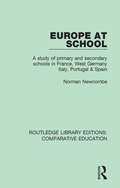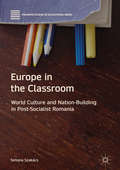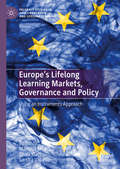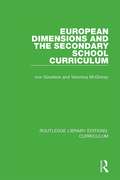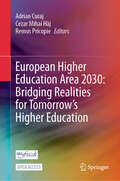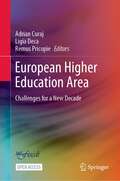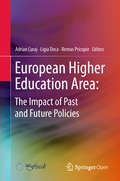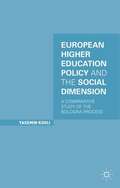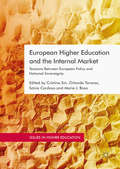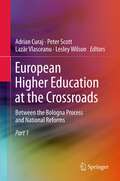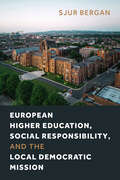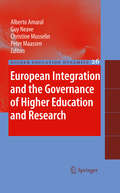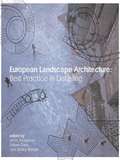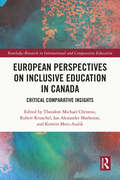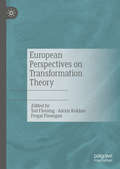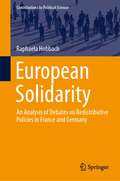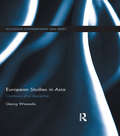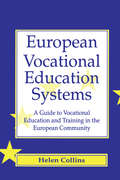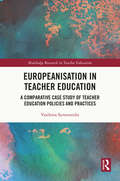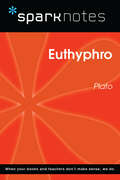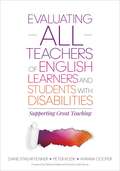- Table View
- List View
Europe at School: A Study of Primary and Secondary Schools in France, West Germany, Italy, Portugal & Spain (Routledge Library Editions: Comparative Education #12)
by Norman NewcombeOriginally published in 1977. This is a lively account of the day-to-day running of European schools based in five countries - France, West Germany, Italy, Spain and Portugal. It outlines the organisation of education in these countries, and examines aspects of curriculum, teaching methods, examinations, attitudes of teachers and pupils, buildings, equipment, out-of-school activities, pastoral care, discipline and rules and depicts what it is like to be a pupil or teacher in a European school. The schools discussed are mainly primary and lower secondary grades - the basic compulsory education of each country. Details of working hours, programmes and curricula which are, notably, often government controlled, are given in Appendices. But the author stresses that his aim throughout has been to show how individual schools work and adopt these rules to their own situation. He discusses the relative advantages and drawbacks of different educational systems, and draws his own conclusions about the favourable impressions he gained from many schools and the Awful Warning he saw in a few. This survey throws as much light on schools at home as on those in Europe and suggests that we have a good deal to learn from our neighbours.
Europe in the Classroom: World Culture and Nation-Building in Post-Socialist Romania (Palgrave Studies in Educational Media)
by Simona SzakácsThis book provides an unconventional account of post-1989 education reform in Romania. By drawing on policy documentation, interviews with key players, qualitative data from everyday school contexts, and extensive textbook analysis, this groundbreaking study explores change within the Romanian education system as a process that institutionalises world culture through symbolic mediation of the concept ‘Europe’. The book argues that the education system’s structural and organisational evolution through time is decoupled from its self-depiction by ultimately serving a nation-building agenda. It does so despite notable changes in the discourse reflecting increasingly transnational definitions of the mission of the school in the post-1989 era. The book also suggests that the notions of ‘nation’ and ‘citizen’ institutionalised by the school are gradually being redefined as cosmopolitan, matching post-war patterns of post-national affiliations on a worldwide level.
Europe's Lifelong Learning Markets, Governance and Policy: Using an Instruments Approach (Palgrave Studies in Adult Education and Lifelong Learning)
by Marcella Milana Gosia Klatt Sandra VatrellaThis book explores European governance and policy coordination within lifelong learning markets. Using an instruments approach, the editors and contributors examine the ways in which governance mechanisms employed by the European Union influence policy to regulate lifelong learning, and intervene in lifelong learning markets, at both European and national levels. Filling an important gap in the current literature, this book examines how strengthened policy coordination at the EU level contributed to the blurring of boundaries between policy fields and the redefinition of the function of adult education after the 2008 recession. Divided into three parts, this book draws on a range of case studies from countries including Spain, Denmark, Bulgaria and the UK. It will be of interest and value to students and scholars of education policy and governance, adult education and lifelong learning.
European Dimensions and the Secondary School Curriculum (Routledge Library Editions: Curriculum #9)
by Ivor Goodson Veronica McGivneyOriginally published in 1985. ‘Europe‘ and the EEC seemed to be virtually synonymous for the majority of our population and the ambivalent feelings many people have about the Community, together with the consistently bad press it received in the UK, seemed to engender a hostility in educational circles towards teaching about Europe as a whole. However, if one of the aims of education is to increase children’s awareness, tolerance and understanding of the world about them; to widen their experience and horizons; then teaching about the wider world must have a place in the curriculum. This book argues for education about Europe, not necessarily in favour of Europe, breaking down the national insularity of the UK curriculum and using Europe as one convenient ‘window on the wider world’.
European Higher Education Area 2030: Bridging Realities for Tomorrow’s Higher Education
by Adrian Curaj Remus Pricopie Cezar Mihai HâjThis open access book presents the major outcomes of the fifth edition of the Future of Higher Education – Bologna Process Researchers’ Conference (FOHE-BPRC5), organized by the Executive Agency for Higher Education, Research, Development and Innovation Funding (UEFISCDI) prior to the 2024 Ministerial Conference in Tirana. The Conference is considered a landmark in the European Higher Education Area, encouraging dialogue between researchers and policy-makers. The resulting book provides a forward-looking perspective on how the EHEA is evolving in response to current challenges and opportunities, by focusing on topics such as internationalization, equity and employability, fundamental values, impact of digitalization or innovative learning and teaching. The papers presented offer insights in these areas, illustrating successful or failed implementations within the EHEA and are published in open access format to ensure that the researchers’ perspectives are widely available to European policy and decision makers. Since 2024 marks the first post pandemic edition of the Conference, it is a good moment to not only to take stock of the challenges brought by the Covid-19 pandemic and the war in Ukraine, but also to explore how scientific research can support policy into shaping the directions for the future to come.
European Higher Education Area: Challenges For A New Decade
by Adrian Curaj Ligia Deca Remus PricopieThis open access book presents the major outcomes of the fourth edition of the Future of Higher Education – Bologna Process Researchers Conference (FOHE-BPRC 4) which was held in January 2020 and which has already established itself as a landmark in the European higher education environment. The conference is part of the official calendar of the European Higher Education Area (EHEA) for events that promote and sustain the development of EHEA. The conference provides a unique forum for dialogue between researchers, experts and policy makers in the field of higher education, all of which is documented in this proceedings volume. The book focuses on the following five sub-themes: - Furthering the Internationalization of Higher Education: Particular - Challenges in the EHEA - Access and Success for Every Learner in Higher Education - Advancing Learning and Teaching in the EHEA: Innovation and Links With Research - The Future of the EHEA - Principles, Challenges and Ways Forward - Bologna Process in the Global Higher Education Arena. Going Digital? While acknowledging the efforts and achievements so far at EHEA level, the Paris Ministerial Communiqué highlights the need to intensify crossdisciplinary and cross-border cooperation. One of the ways to achieve this objective is to develop more efficient peer-learning activities, involving policymakers and other stakeholders from as many member states as possible for which this book provides a platform. It acknowledges the importance of a continued dialogue between researchers and decisionmakers and benefits from the experience already acquired, this way enabling the higher education community to bring its input into the 2020. European Higher Education Area (EHEA) priorities for 2020 onwards. European Higher Education Area: Challenges for a New Decade marks 21 years of Bologna Process and 10 years of EHEA and brings together an unique collection of contributions that not only reflect on all that has been achieved in these years, but more importantly, shape directions for the future. This book is published under an open access CC BY license.
European Higher Education Area: The Impact of Past and Future Policies
by Adrian Curaj Ligia Deca Remus PricopieThis volume presents the major outcomes of the third edition of the Future of Higher Education – Bologna Process Researchers Conference (FOHE-BPRC 3) which was held on 27-29 November 2017. It acknowledges the importance of a continued dialogue between researchers and decision-makers and benefits from the experience already acquired, this way enabling the higher education community to bring its input into the 2018-2020 European Higher Education Area (EHEA) priorities. The Future of Higher Education – Bologna Process Researchers Conference (FOHE-BPRC) has already established itself as a landmark in the European higher education environment. The two previous editions (17-19 October 2011, 24-26 November 2014), with approximately 200 European and international participants each, covering more than 50 countries each, were organized prior to the Ministerial Conferences, thus encouraging a consistent dialogue between researchers and policy makers. The main conclusions of the FOHE Conferences were presented at the EHEA Ministerial Conferences (2012 and 2015), in order to make the voice of researchers better heard by European policy and decision makers. This volume is dedicated to continuing the collection of evidence and research-based policymaking and further narrowing the gap between policy and research within the EHEA and broader global contexts. It aims to identify the research areas that require more attention prior to the anniversary 2020 EHEA Ministerial Conference, with an emphasis on the new issues on rise in the academic and educational community. This book gives a platform for discussion on key issues between researchers, various direct higher education actors, decision-makers, and the wider public. This book is published under an open access CC BY license.
European Higher Education Policy and the Social Dimension
by Yasemin KooijThe Bologna Process has significantly shaped recent higher education policies across Europe, but the area of the social dimension has so far been neglected. Drawing on a cross-country case study (Finland, Germany and Turkey), this book examines the major Bologna reforms, in particular the social dimension, and whether this aspect has successfully been incorporated into policy. Discussing key themes, actors, goals, policies and agendas and setting out recommendations, this book examines the social dimension as a component of the Bologna Process.
European Higher Education and the Internal Market: Tensions Between European Policy and National Sovereignty (Issues in Higher Education)
by Orlanda Tavares Cristina Sin Sónia Cardoso Maria J. RosaThis book analyses European higher education policies and their three main drivers: the European Commission, the European Court of Justice and the building of the European Higher Education Area through the Bologna Process. Central to the volume is the issue of European institutions’ intervention in higher education: building a common area for higher education in a domain protected by subsidiarity is no easy task, and one that must consider the supra-national, national and institutional levels that all play a role in policy implementation. In this volume, the editors and contributors navigate within the tensions between the establishment of an internal market on the one hand and national sovereignty on the other. This volume will surely be of interest and value to those studying and working in the area of higher education policy and understanding relationships between European institutions and member states.
European Higher Education at the Crossroads
by Peter Scott Adrian Curaj Lesley Wilson Lazăr VlasceanuRomania hosts the 2012 Bologna / European Higher Education Area Ministerial Conference and the Third Bologna Policy Forum. In preparation for these meetings, The Executive Agency for Higher Education, Research, Development and Innovation Funding (UEFISCDI) organised the Future of Higher Education - Bologna Process Researchers' Conference (FOHE-BPRC) in Bucharest on 17-19 October 2011, with the support of the European University Association (EUA) and the Romanian National Committee for UNESCO. The conference brought the voices of researchers into international-level policy making in higher education. The results of the conference are presented in this book. Until now, empirical evidence supporting policies and reforms in higher education has often been a matter of local or regional focus. The development of a pan-European process in higher education policy drives a need to explore wider research topics on which to base policies. This book offers an unprecedented opportunity for higher education researchers to interact and contribute to the political process shaping the European Higher Education Area (EHEA), and to national policy agendas in more than 100 participant countries for the 2012 ministerial events. The book collects more than 50 articles focusing on vital issues in European higher education. These are arranged in sections addressing the European Higher Education Area (EHEA) Principles; Teaching and Learning; Quality Assurance; Mobility; Higher Education Governance in the EHEA; Funding of Higher Education; Diversification of Higher Education Missions; Higher Education Futures and Foresight.
European Higher Education, Social Responsibility, and the Local Democratic Mission (Higher Education, Place, and Social Responsibility)
by Sjur BerganEducation is about more than preparing students for the labor market; it is about preparing them to be active citizens in democratic societies, to engage in personal growth, and to develop a broad, advanced knowledge base. As Sjur Bergan emphasizes in European Higher Education, Social Responsibility, and the Local Democratic Mission, advocacy is required to ensure that higher education institutions meet these goals through cooperation with their local communities. Bergan outlines the political and institutional complexity of European universities. He explains how history, cultural traditions, and national identities impact education across Europe. He also describes the roles of the Council of Europe and U.S. higher education in the development of a transatlantic cooperation on the democratic mission of higher education. Other chapters explore education programs for developing and maintaining democracy and human rights, pragmatic and creative ways that European universities are working with their local communities, and the development of education opportunities for refugees. Ultimately, Bergan’s book explores not only the local democratic mission of higher education as it has developed in Europe, but also how it could continue to develop, and why it is important it does so. In the series Higher Education, Place, and Social Responsibility.
European Integration and the Governance of Higher Education and Research
by Guy Neave Peter Maassen Christine Musselin Alberto AmaralThe present volume aims at analysing the change process which the European university is undergoing as a consequence of European integration efforts. In the case of higher education, these have materialised, amongst other things, in the implementation of the Bologna process, while the Lisbon summit also has important consequences for the university. Given the overall ambitions and goals of the Lisbon agenda and the Bologna process, and other relevant supranational and intergovernmental European integration processes, it is obvious that these processes have the intention to affect the university in all its basic structural features, including the way it performs its basic activities. However, the European Commission does not have a formal authority with respect to the university, nor did the governments that signed the Bologna process develop an executive administrative capacity for implementing the Bologna Declaration. As a consequence, whether and how the supranational and intergovernmental European integration processes actually affect university governance and the university as a social institution, is far from clear. This book discusses the nature and possible effects of these very complex processes by analysing the many facets and levels of higher education policy making in the European Union and a number of case studies that focus on the responses of higher education systems to external pressures for change originating from the integration process.
European Landscape Architecture: Best Practice in Detailing
by Ian H. Thompson Torben Dam Jens Balsby NielsonDrawing together case studies from all over Europe, this text explores the relationship between the overall idea of the landscape architecture for a site and the design of details. Examining concept sketches and design development drawings in relation to the details of the design, the book offers a more profound understanding of decision making through all stages of the design process. The book includes the study of the choice of materials and techniques of construction, and explores the cultural and symbolic significance of such choices, as well as questions of environmental sustainability. With projects analyzed and evaluated here that have won international acclaim, or have been awarded national prizes, European Landscape Architecture is a core book in the study and understanding of the subject.
European Perspectives on Inclusive Education in Canada: Critical Comparative Insights (Routledge Research in International and Comparative Education)
by Theodore Michael ChristouFeaturing leading voices in the field from across Canada and Europe, this edited collection offers empirical analyses of the historical, social, cultural, and legislative determinants of inclusive education in Canadian schools. Covering four thematic areas including the structure, culture, and practices of inclusive education, the volume offers comparative insights from a European perspective, engaging critically with widely held views of Canada as a world leader in inclusive education. Providing rich comparisons with educational systems in Germany, Spain, and Finland, chapters explore in-depth the assessment structures and curricula specific to Canada, as well as educational policy, and explore attitudes and practices in relation to diverse student populations, including refugee and indigenous peoples, and students with special educational needs. This volume will benefit researchers, academics, and educators with an interest in multicultural education, international and comparative education, as well as educational policy more specifically. Those involved with inclusion and special educational needs will also benefit from this volume.
European Perspectives on Transformation Theory
by Ted Fleming Fergal Finnegan Alexis KokkosThis book offers a concise and comprehensive exploration of the theory of transformative learning by European researchers. Exploring Mezirow’s theory of transformative learning as a ‘living theory’, the editors and contributors ask whether there a uniquely European perspective on this theory that reflects Europe’s traditions and contexts. What is the nature of that perspective, and how is it similar or different to those espoused in the USA? This book outlines how the theory of transformative learning has been developed by European researchers, and how it has built upon, critiqued, and enriched the Transformation Theory proposed by Mezirow. Consequently, this volume outlines new theoretical perspectives for the future evolution of transformative learning and explores theoretical perspectives that can be put into practice in a range of fields. This wide-ranging volume will be of interest and value to all those interested in transformative learning theory.
European Policy Implementation and Higher Education
by Alberto Amaral Cristina Sin Amélia VeigaThis book presents a critical analysis of the implementation of the Bologna Process, its achievements and consequences, as well as its failures and lack of convergence problems. Over the last decade the implementation of the Bologna Process, an ambitious reform of European higher education systems, has attracted attention from politicians, academics, students and scholars in higher education policy. Taking Portugal as a case study, the book includes an analysis of the perceptions and the practices, formed at the institutional level in respect of the key objectives laid down at the European level, namely employability, mobility and attractiveness.
European Solidarity: An Analysis of Debates on Redistributive Policies in France and Germany (Contributions to Political Science)
by Raphaela HobbachThis book addresses the central question of European solidarity in the face of a multitude of crises in Europe and focuses on its discursive manifestation in public debates. It is the first to systematically examine national debates on redistributive policies in the EU and the role of European solidarity within them by analysing French and German parliamentary debates on redistributive EU policies during the euro crisis and the migration crisis. By doing so, the book addresses the question of how relevant the idea of European solidarity is when redistributive policies in the EU are discussed at the national level and examines the conditions under which it is ascribed more or less relevance. Moreover, the book reveals that what European solidarity actually means in practice is often highly contested.
European Studies in Asia: Contours of a Discipline (Routledge Contemporary Asia Series)
by Georg WiessalaAs countries across Asia continue to rise and become more assertive global powers, the role that Higher Education has played, and continues to play, in this process is an issue of growing pertinence. Furthermore, understanding the relationship between Europe and Asia fostered by historical and contemporary knowledge transfer, including Higher Education, is crucial to analysing and encouraging the progress of both regional integration and inter-regional cooperation. With a specific focus on international Higher Education, European Studies in Asia investigates knowledge transfer and channels of learning between Europe and Asia from historical, contemporary and teaching perspectives. The book examines a selection of significant historical precedents of intellectual dialogue between the two regions and, in turn, explores contemporary cross-regional discourses both inside and outside of the official frameworks of the European Union (EU) and the Asia--Europe Meetings (ASEM). Drawing on extensive case studies based on many of his own teaching experiences, Georg Wiessala addresses key questions, such as the nature and construction of the European Studies in Asia curriculum; aspects of ‘values’, co-constructed learning and adult pedagogy in the discipline of European Studies in Asia; the politics of Asian host cultures, the ‘internationalization’ of Asian Higher Education and the experiences and expectations of tertiary sector students of this subject in Asia, Australia and New Zealand. In doing so, the author articulates a range of outcomes for the further development of Higher Education cooperation agendas between Asia and Europe, in the discipline of European Studies, and in related fields such as International Relations. This case study-led book makes an original and novel contribution to our understanding of European Studies in Asia. As such, it will be of great interest to students and scholars of Asian Education, Comparative Education, European Studies and International Relations.
European Vocational Educational Systems
by Collins, HelenThis detailed reference work describes the vocational training systems available in EC member states. It deals with the vocational qualification systems within each country and outlines EC programmes that promote the recognition of training schemes.
Europeanisation in Teacher Education: A Comparative Case Study of Teacher Education Policies and Practices (Routledge Research in Teacher Education)
by Vasileios SymeonidisThis book explores the phenomenon and process of Europeanisation in the field of teacher education. Drawing on comparative case studies in Austria, Greece and Hungary, it examines empirical data and analyses key themes around the continuum of teacher education, the development of teacher competence frameworks, and the support to teacher educators. The book is the first of its kind to systematically research the landscape of European teacher education, exploring the interactions between national and European influences in the trajectory of teacher education policy and practice. Chapters offer an original and in-depth understanding of European influences that draw on evidence from policy documents and interviews with relevant stakeholders. It argues that teacher education systems are being Europeanised, although at different speeds and directions for each country. Factors such as the socio-political and economic contexts, historical traits and policy actors’ preferences at both national and institutional levels determine the translation process. This book will be of great interest for academics, educational researchers, practitioners and policymakers in Europe and beyond, informing wider discussions about the emerging European context in teacher education, education policy and what it means to be a European teacher.
Euthyphro (SparkNotes Philosophy Guide)
by SparkNotesEuthyphro (SparkNotes Philosophy Guide) Making the reading experience fun! SparkNotes Philosophy Guides are one-stop guides to the great works of philosophy–masterpieces that stand at the foundations of Western thought. Inside each Philosophy Guide you&’ll find insightful overviews of great philosophical works of the Western world.
Eva And The New Owl (Owl Diaries #4)
by Rebecca ElliottPick a book. Grow a Reader! This series is part of Scholastic's early chapter book line Branches, aimed at newly independent readers. With easy-to-read text, high-interest content, fast-paced plots, and illustrations on every page, these books will boost reading confidence and stamina. Branches books help readers grow! In book #4, a new owl named Hailey starts in Eva's class at school. Eva is always happy to meet new people, and she's excited to make a new friend! But the new owl befriends Lucy instead of her. So Eva gets jealous. Lucy is Eva's best friend! Will Eva lose her best friend? Or can Eva and Lucy BOTH make a new friend?
Eva's Treetop Festival: A Branches Book (Owl Diaries #1)
by Rebecca ElliottThis adorable early chapter book series is perfect for young girls who love friendship stories starring animal characters!This series is part of Scholastic's early chapter book line called Branches, which is aimed at newly independent readers. With easy-to-read text, high-interest content, fast-paced plots, and illustrations on every page, these books will boost reading confidence and stamina. Branches books help readers grow!Eva Wingdale gets in over her head when she offers to organize a spring festival at school. Even with her best friend Lucy's help, there is NO way she will get everything done in time. Will Eva have to ask Sue (a.k.a. Meanie McMeanerson) for help? Or will the festival have to be cancelled? This book is written as Eva's diary -- with Rebecca Elliott's owl-dorable full-color illustrations throughout!
Evaluating ALL Teachers of English Learners and Students With Disabilities: Supporting Great Teaching
by Diane Staehr Fenner Peter L. Kozik Ayanna C. CooperUnique Student Strengths and Needs Require Unique Teacher Evaluation Methods. Teacher evaluation should never be used in a “one-size-fits-all” manner, especially when evaluating all teachers who work with English Learners (ELs) and students with disabilities. Evaluations of all teachers who work with diverse learners require unique considerations. Such considerations are precisely what you’ll learn in this comprehensive, action-oriented book. Backed by research and case studies, the authors detail: Four Principles for Inclusive Teacher Evaluation of diverse learners compatible with the Danielson and Marzano frameworks Specialized “look-fors” evaluators can use and adapt to recognize effective teaching of diverse learners Strategies for coaching teachers who need more support reaching diverse learners
Evaluating ALL Teachers of English Learners and Students With Disabilities: Supporting Great Teaching
by Diane Staehr Fenner Peter L. Kozik Ayanna C. CooperUnique Student Strengths and Needs Require Unique Teacher Evaluation Methods. Teacher evaluation should never be used in a “one-size-fits-all” manner, especially when evaluating all teachers who work with English Learners (ELs) and students with disabilities. Evaluations of all teachers who work with diverse learners require unique considerations. Such considerations are precisely what you’ll learn in this comprehensive, action-oriented book. Backed by research and case studies, the authors detail: Four Principles for Inclusive Teacher Evaluation of diverse learners compatible with the Danielson and Marzano frameworks Specialized “look-fors” evaluators can use and adapt to recognize effective teaching of diverse learners Strategies for coaching teachers who need more support reaching diverse learners
